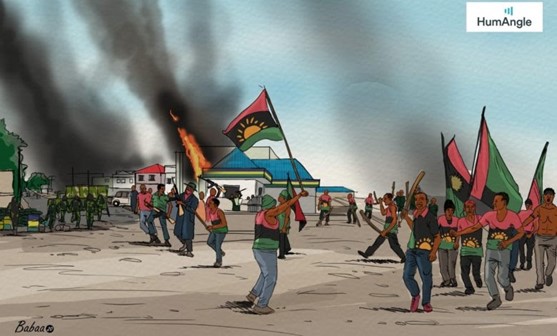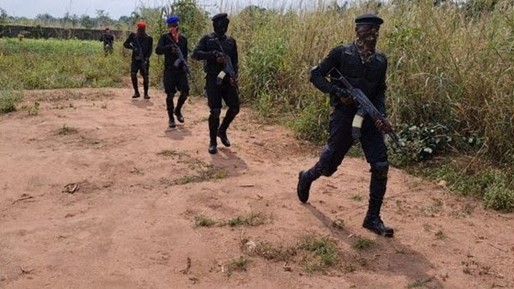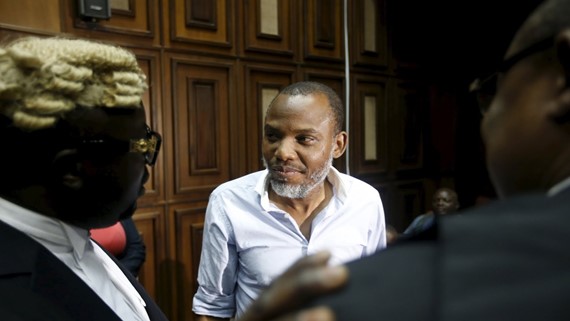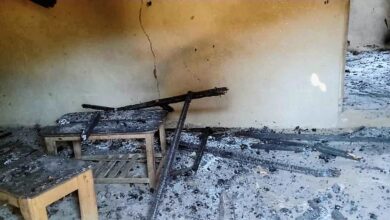Is An Insurgency Slowly Gathering Momentum In Southeast Nigeria?

Nigeria, Africa’s most populous nation, is facing the threat of a Biafran insurgency, 51 years after the end of a brutal civil war between the country’s federal troops and soldiers of the breakaway state of Biafra, which had led to the death of an estimated three million people.
The proscription and designation of the Indigenous People of Biafra (IPOB) as a terrorist group and series of military operations in the past few years have been unable to curtail the group’s separatist agitations as well as recruitment activities in the Southeast and Igbo-speaking areas of the South-South.
On Sunday, Dec. 13, IPOB announced the launch of Eastern Security Network (ESN), a militant-style unit the group said was formed to address security challenges in the Southeast and South-South regions.
Multiple videos have been released online showing ESN conducting combat drills and holding military-grade rifles.

In recent months, there has been a gradual build of tension and violent confrontation between separatists, security forces and locals considered not sympathetic to IPOB.
On Monday, Nigerian troops in combat fatigue stormed Orlu, the second-largest city in Imo State after the capital Owerri, in an attempt to search for and possibly neutralise members of the IPOB ESN militant wing. The incident was preceded by reports of harassment of locals, destruction of government properties and skirmishes with security personnel.
About five buildings including a church, Blessed Holy Trinity Sabbath Mission, in Okporo, Orlu local government area, were set ablaze on Friday, Jan. 22, when the security forces raided the area in search of members of the Eastern Security Network.
Monday’s clashes and violence led to a dusk-to-dawn curfew in 10 local government areas in the state to forestall the breakdown of law in Orlu and other affected areas.
“This afternoon, I received a very disturbing report on the activities of a group of militants who unleashed a shooting spree in the Orlu area of the state, killing and maiming innocent citizens in the process,” the governor, Hope Uzodinma, said during his announcement of the restrictions.
Coincidentally, Orlu was part of the last areas to fall under the control of the federal government in 1970, bringing the two and year civil war to a conclusive end.
HumAngle understands that IPOB has gathered an estimated one million active followers and sympathisers who deeply subscribe to the group’s aspirations and narratives that rekindle the dreams of a Biafran State.
The group deploys a wide range of propaganda mediums including campaigners in communities and social media platforms, including Twitter and Facebook, and Radio Biafra to push separatist narratives and vilify the Nigerian state.
IPOB leader Nnamdi Kanu has routinely spread inflammatory messages, particularly through broadcasts on the pirate radio channel, Radio Biafra, which he founded in 2009.
He was arrested in October 2015 in Nigeria’s economic capital Lagos, in the southwestern part of the country, on charges of conspiring to commit treason. He was detained for about 18 months and then released pending his trial. Kanu subsequently jumped bail in 2017 and fled the country.

The group has gradually shadowed and regularly clashed with the older Movement for the Actualisation of the Sovereign State of Biafra (MASSOB), another separatist group founded by Ralph Unwazurike in 1999.
Deepening social grievances, perceived marginalisation and deterioration of economic opportunities have played a role in galvanising support for IPOB’s calls for a referendum, boycotts and rallies.
A 2017 poll conducted by SBM Intelligence, a Lagos-based think tank, found that Biafran sentiments among the local populace were growing.
“Our survey reveals that in general terms, there is rising support for a Biafra in the South East and South-South geopolitical zones. However, those who support secession are not yet in the majority. More people are inclined towards a restructuring within a united Nigeria,” SBM noted.
A disturbing trend is the group’s efforts to recruit soldiers deployed for counter-insurgency operations in the Northeast. It recently admitted that five soldiers had resigned from the Nigerian Army to join its militant wing, and said many more were set to voluntarily retire for the same reason. The group has, since 2019, been dissuading easterners from joining the armed forces, citing instances where soldiers were killed by insurgents.
In October, about five soldiers and four members of IPOB were reported killed following a clash between both parties in the Oyigbo local government area of Rivers State. The Rivers police command also reported that two of its officers were killed by IPOB members, four stations were razed and at least 50 vehicles were burnt, including one Armoured Personnel Carrier.
The 6 Division of the Nigerian Army further revealed that six of its personnel were killed and weapons carted away by the group. The violence led to a curfew.
“I don’t support criminality. IPOB killed six army officers, four policemen, burnt police stations and court buildings. This is Rivers State, go to Oyigbo and see the level of destruction. Now, the state government will be rebuilding those facilities,” said the Rivers State Governor Nyesom Wike.
Governor Wike stated this when he received members of the Nigerian Guild of Editors at Government House in Port Harcourt.
Also in October, the Arewa community in Abia State demanded compensation for its members killed and properties allegedly destroyed by IPOB.
The group claimed that five of its members were killed and many injured by suspected IPOB separatist agitators in Aba, the commercial centre of Abia State.
In September, witnesses said armed men attacked policemen on duty in Owerri Nkworji in Nkwerre local government area and at Egbu, a suburb of Owerri, of the state and stole their rifles.
“They also set ablaze the operational vehicles of the policemen,” HumAngle was informed.
On August 23, two operatives of Nigeria’s domestic intelligence, the State Security Services were killed by members of IPOB in Emene, Enugu State.
“The Service lost two personnel in what was clearly an unprovoked violent attack launched by IPOB on the team,” Peter Afunanya, the SSS spokesperson, said.
Following a subsequent attack on a police outpost in Enugu, the Nigerian army placed its troops on high alert.
Earlier in July, the police in Imo State clashed with the members of IPOB in Orji, Owerri, while they were gathered to receive the corpse of a member.
From indications, the brewing crisis and rebellion in the Southeast require intelligence-based security interventions and efforts to address the underlying stressors sustaining the agitation.
Support Our Journalism
There are millions of ordinary people affected by conflict in Africa whose stories are missing in the mainstream media. HumAngle is determined to tell those challenging and under-reported stories, hoping that the people impacted by these conflicts will find the safety and security they deserve.
To ensure that we continue to provide public service coverage, we have a small favour to ask you. We want you to be part of our journalistic endeavour by contributing a token to us.
Your donation will further promote a robust, free, and independent media.
Donate Here





Wow….Nigeria will be better soon✊✊✊✊